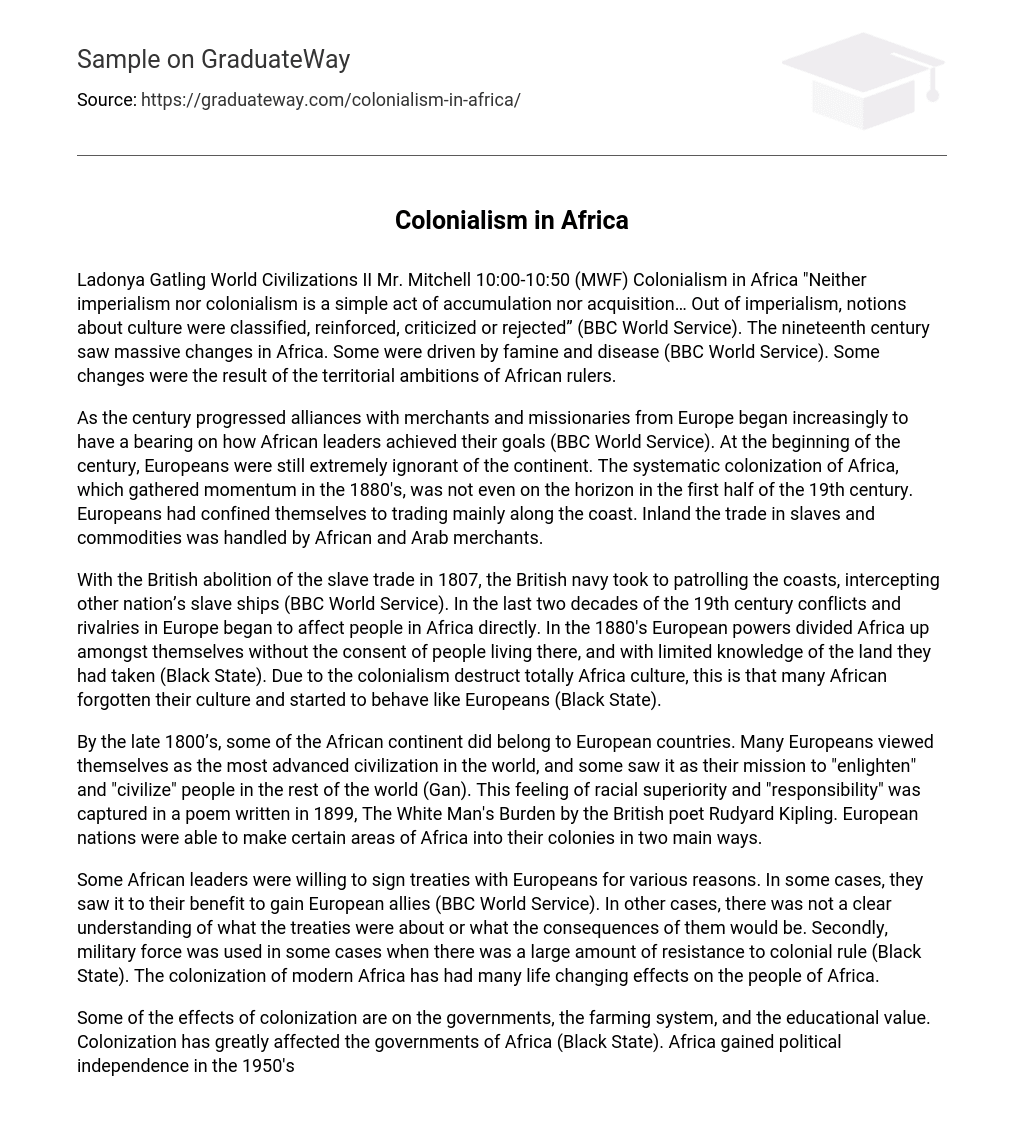Ladonya Gatling World Civilizations II Mr. Mitchell 10:00-10:50 (MWF) Colonialism in Africa “Neither imperialism nor colonialism is a simple act of accumulation nor acquisition… Out of imperialism, notions about culture were classified, reinforced, criticized or rejected” (BBC World Service). The nineteenth century saw massive changes in Africa. Some were driven by famine and disease (BBC World Service). Some changes were the result of the territorial ambitions of African rulers.
As the century progressed alliances with merchants and missionaries from Europe began increasingly to have a bearing on how African leaders achieved their goals (BBC World Service). At the beginning of the century, Europeans were still extremely ignorant of the continent. The systematic colonization of Africa, which gathered momentum in the 1880’s, was not even on the horizon in the first half of the 19th century. Europeans had confined themselves to trading mainly along the coast. Inland the trade in slaves and commodities was handled by African and Arab merchants.
With the British abolition of the slave trade in 1807, the British navy took to patrolling the coasts, intercepting other nation’s slave ships (BBC World Service). In the last two decades of the 19th century conflicts and rivalries in Europe began to affect people in Africa directly. In the 1880’s European powers divided Africa up amongst themselves without the consent of people living there, and with limited knowledge of the land they had taken (Black State). Due to the colonialism destruct totally Africa culture, this is that many African forgotten their culture and started to behave like Europeans (Black State).
By the late 1800’s, some of the African continent did belong to European countries. Many Europeans viewed themselves as the most advanced civilization in the world, and some saw it as their mission to “enlighten” and “civilize” people in the rest of the world (Gan). This feeling of racial superiority and “responsibility” was captured in a poem written in 1899, The White Man’s Burden by the British poet Rudyard Kipling. European nations were able to make certain areas of Africa into their colonies in two main ways.
Some African leaders were willing to sign treaties with Europeans for various reasons. In some cases, they saw it to their benefit to gain European allies (BBC World Service). In other cases, there was not a clear understanding of what the treaties were about or what the consequences of them would be. Secondly, military force was used in some cases when there was a large amount of resistance to colonial rule (Black State). The colonization of modern Africa has had many life changing effects on the people of Africa.
Some of the effects of colonization are on the governments, the farming system, and the educational value. Colonization has greatly affected the governments of Africa (Black State). Africa gained political independence in the 1950’s. Even though political independence was gained there are still many problems with their governments (Black State). There is a lack of political experience. Political boundaries, set by the Europeans, have cut across ethnic lines putting diverse people under the same government. This has lead to civil wars.
The military is also weak (The Colonization of Modern Africa). Three major impacts of colonialism in Africa are native ethnic tension and violence, long lasting racial oppression, and widespread poverty (The Colonization of Modern Africa). . Importation of the colonialism in Africa societies led to the following, Intensive Exploitations for example Land alienation, where Africans forced to live unfertile soil and the good and fertile soil remained by the colonialist, Forced labor, this is that African forced to work in Europeans large plantation and mine with little resting or not.
Apart from the above the introduction of the principal and the laws of obtaining the cheap labor in the plantation would made Africans to be more exploited, this is that the working class were provided the card so as to be identified if they worked and those who are not they worked yet, a good example is Kenya which was called Kipande system this system was introduced by the British (Gan) .
The Scramble for Africa took place between 1886 and 1914 [ (The Colonization of Modern Africa) ]. During this time, European countries colonized all of Africa, with the exception of Ethiopia and Liberia. As is shown the following map, Britain, France, and Portugal were the main colonial powers in Africa, but Belgium, Germany, Italy, and Spain also had colonies [ (The Colonization of Modern Africa) ]. Most colonial economies in Africa are called mono-economies by economists.
This indicates that the colonial economies were dependent on mining, settler agriculture, or the small scale production of a single cash crop. There were a few exceptions to this trend. By the end of colonialism in South Africa (1994), the country had a very vibrant and diversified economy boasting mineral, agricultural, and manufacturing industries, and an advanced commerce sector. Another example of a mixed economy is Nigeria [ (The Colonization of Modern Africa) ].
In the 1950s, the last decade before independence, the discovery of large reserve of petroleum helped diversify an agriculturally based economy [ (The Colonization of Modern Africa) ].
Works Cited BBC World Service. <http://www. bbc. co. uk/worldservice/africa/features/storyofafrica/index_section11. shtml>. Black State. <http://www. blackstate. com/africaonthebrink. html>. Gan, Duignan. Colonialism in Africa 1870-1960. Cambridge University Press, 1971. The Colonization of Modern Africa. <http://www. 123helpme. com/view. asp? id=23496>.





